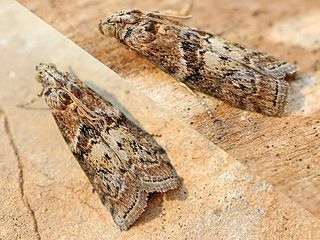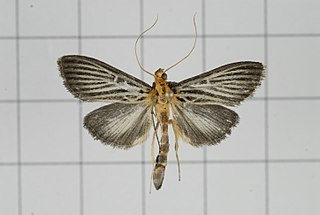Related Research Articles

The Pyralidae, commonly called pyralid moths, snout moths or grass moths, are a family of Lepidoptera in the ditrysian superfamily Pyraloidea. In many classifications, the grass moths (Crambidae) are included in the Pyralidae as a subfamily, making the combined group one of the largest families in the Lepidoptera. The latest review by Eugene G. Munroe and Maria Alma Solis retain the Crambidae as a full family of Pyraloidea.

The Pyraloidea are a moth superfamily containing about 16,000 described species worldwide, and probably at least as many more remain to be described. They are generally fairly small moths, and as such, they have been traditionally associated with the paraphyletic Microlepidoptera.

Spilomelinae is a very species-rich subfamily of the lepidopteran family Crambidae, the crambid snout moths. With 4,132 described species in 340 genera worldwide, it is the most speciose group among pyraloids.

Elophila nymphaeata, the brown china mark, is a species of moth of the family Crambidae. It was described by Carl Linnaeus in his 1758 10th edition of Systema Naturae. It is found in Europe and across the Palearctic to the Russian Far East and China. The moth is notable as its larva, like most members of the crambid subfamily Acentropinae, is aquatic and has tracheal gills.
Anatralata is a genus of moths of the family Crambidae. It contains only one species, Anatralata versicolor, which is found in North America, where it has been recorded from California to Idaho and British Columbia. The habitat consists of mountainous areas and low-elevation grasslands along the coast of central California.

The Phycitinae are a subfamily of snout moths. Even though the Pyralidae subfamilies are all quite diverse, Phycitinae stand out even by standards of their family: with over 600 genera considered valid and more than 4000 species placed here at present, they unite up more than three-quarters of living snout moth diversity. Together with the closely related Epipaschiinae, they are apparently the most advanced lineage of snout moths.

Orenaia alpestralis is a species of moth in the family Crambidae.

Scopariinae is a subfamily of the lepidopteran family Crambidae. The subfamily was described by Achille Guenée in 1854.
Pyrausta tetraplagalis is a moth in the family Crambidae. It is found in the Democratic Republic of Congo and Zimbabwe.
Tulaya margelana is a moth in the family Crambidae. It was described by George Thomas Bethune-Baker in 1893. It is found in Iran.
Tabidia strigiferalis is a moth in the family Crambidae. It is found in China, Korea and Russia.
Tabidia candidalis is a moth in the family Crambidae. It is found in China and India.

Palpita quadristigmalis, the four-spotted palpita moth, is a moth in the family Crambidae. It is found in North America, where it has been recorded from Quebec and Ontario to Florida, west to Arizona and north to Colorado.
Phaedropsis venadialis is a moth in the family Crambidae. It was described by Schaus in 1920. It is found in Mexico (Sinaloa).
Sameodes odulphalis is a moth in the family Crambidae. It is found in the Philippines (Luzon).
Sameodes ennoduisalis is a moth in the family Crambidae. It is found in the Philippines (Luzon).

Tyspanodes hypsalis is a moth in the family Crambidae. It was described by Warren in 1891. It is found in China, Korea and Taiwan.
Tyspanodes flaviventer is a moth in the family Crambidae. It was described by Warren in 1891. It is found in India.
Ambia oligalis is a moth in the family Crambidae. It is found on the Louisiade Islands.

Lineodini is a tribe of the species-rich subfamily Spilomelinae in the snout moth family Crambidae.
References
- ↑ "global Pyraloidea database". Globiz.pyraloidea.org. Retrieved 2014-07-15.
- ↑ Proceedings of the general meetings for scientific business of the Zoological Society of London
 This article incorporates text from this source, which is in the public domain .
This article incorporates text from this source, which is in the public domain .